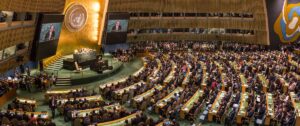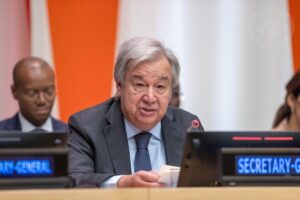The incoming Biden Administration faces a daunting set of challenges going into 2021, including doubts about U.S. global leadership and the fallout from a worldwide pandemic. The United States has traditionally benefited from its prominent role in guiding and directing the work of international organizations, especially the United Nations, to advance its foreign policy goals. The U.S. commitment to international institutions in recent years, however, has declined, as evidenced, in part, by its withholding of financial support. This has cost the U.S. influence and prestige, adversely affecting its national interests. The U.S. has an opportunity in 2021 to restore a credible and meaningful leadership role, in part through a renewed commitment to ensuring that the UN is adequately resourced and funded.
The biggest and most impactful component of the UN budget is for peacekeeping operations, where the U.S. is falling short of its treaty commitments to provide financial resources at the assessed amount. Accumulated U.S. arrearages for UN peacekeeping have surpassed $1 billion. This growing deficit is causing serious repercussions for UN peacekeeping missions and the nations which provide troops to these operations around the world.
The new Biden Administration, however, can make genuine progress in aligning what the U.S. is willing to pay with its currently assessed rate by exercising sufficient political will either to undertake a robust diplomatic outreach effort to cap the future U.S. rate or seek Congressional approval to remain at the higher currently-assessed rate. A successful diplomatic effort to lock in a cap could be an important foundation for dependable long-term U.S. financial support.
In late 2021, UN member states will negotiate their shares of the UN regular and peacekeeping budgets for the following three years. The United States, if prepared and determined, can use its leadership to shape the outcome. A realistic plan should include developing a diplomatic strategy, working with allies (including through and with Congress), and demonstrating a commitment to supporting the modernization of UN peace operations. That approach will also need specifics on how it will pay off nearly $1 billion in U.S. peacekeeping arrears, as well as establish a convincing and credible basis for meeting its future financial obligations in full and on time.
Background
The UN scales of assessments determine each member state’s share of the UN’s regular and peacekeeping budgets. They are based broadly on the principle of capacity to pay, as measured by share of world gross national income, with separate rates for the UN Regular and Peacekeeping budgets. Both rates are formulaic and based on economic data, coupled with political elements that include discounts for less developed countries and premiums for the five permanent members of the UN Security Council. With the largest share, the U.S. Regular Budget assessment is capped at 22 percent. The U.S. share of the UN peacekeeping budget is higher, as it is based on the 22 percent Regular Budget rate, plus a 5.9 percent “premium” in the 2018-21 cycle applied to the United States as a Security Council Permanent Member. The premium finances peacekeeping assessment discounts for nearly 70% of UN member states considered less developed.
In the past, the U.S. has also sought a 25 percent limit on the peacekeeping budget. In the 1990s, the U.S. Congress capped U.S. funding for UN peacekeeping at this level. After the 1999 Helms-Biden deal, the Congress temporarily waived the 25 percent upper limit when the U.S. gained a reduction in its share from 30.4 percent to close to 26 percent in 2000. Since then, the assessed U.S. share has oscillated between 27 percent and 29 percent. Until 2017, a combination of occasional Congressional waivers and the application of peacekeeping credits still allowed the U.S. to fulfill its financial obligations.
The Trump Administration early on indicated its intention to adhere strictly to the 25 percent Congressional limit and not seek a waiver. In fact, the Administration’s initial budget submission to Congress proposed even deeper cuts in funding for UN peacekeeping operations, in line with its approach to reducing funding for all international organizations. The budget requests were far below the amount required to meet U.S. assessments. For peacekeeping (funded through the Contributions for International Peacekeeping Activities (CIPA), account) the budget request amounted only to a 15-16 percent budget share. Congress ignored the request and appropriated funding at the 25 percent level. Even so, the Administration did not seek negotiations to avoid U.S. arrears, ruled out using any remaining credits from peacekeeping mission to balance out the arrears, and opted not to request a Congressional waiver to exceed the 25 percent limit.
As a result, U.S. contributions for UN peacekeeping from 2019-2021 are an approximate average of 2.9 percentage points below the UN’s assessed rate. This has so far resulted in accumulated U.S. arrears of over $1 billion, resulting in strains to the 2020-21 annual UN peacekeeping budget of $6.58 billion.
The negative impact on peacekeeping operations and effectiveness is starting to undermine mandates the U.S. has supported through the Security Council. In a March 2019 report the UN Secretary General said “Peacekeeping operations also face frequent cash constraints that force the Organization to postpone the settlement of its obligations to troop – and police-contributing countries.” He added that success in peacekeeping would depend on “the predictability and adequacy of [member state] financial contributions to United Nations programmes and activities.” While some other UN member states have also delayed paying their bills, the U.S. arrears are by far the largest hole in the UN peacekeeping budget.
A Strategy of Renewal
The year 2021 will see a new U.S. Presidential Administration – and UN budget negotiations on a new regular and peacekeeping Scales of Assessment for 2022-24. To put UN peacekeeping back on a sustainable and predictable financial path, the U.S. will need to establish some core principles guided by aspirational goals and abiding domestic and international political realities. These principles should include:
- an unequivocal commitment to the financial security of the United Nations, including timely and full payment of UN dues;
- a willingness to pursue from the U.S. Congress a multi-year timeline to pay back the accumulated arrears to the UN regular and peacekeeping budgets; and
- a firm statement of intent to seek agreement from UN members for a budgetary cap of 25 percent on peacekeeping assessed contributions.
To succeed, the United States will need to design and carry out a major diplomatic effort with key allies and influential UN member states, involving coordinated messages from across the U.S. government. The Biden Administration will also need to marshal a domestic consensus on the value to U.S. national interests of a strong and effective UN to gain the necessary political support to fulfill financial commitments to the UN.
The mechanics of the budget deal will be essential. An agreed reduction of the U.S. assessment to 25 percent will mean that some combination of other member states will need to take on an additional 2.9 percentage share of the budget. No other country, especially with the fiscal havoc wreaked by the COVID pandemic, will be eager to accept additional financial burdens. The promise of the U.S. paying off its arrears along with an unequivocal commitment to meet its financial obligations may attract some support but the U.S. may need to provide further, specific incentives to obtain majority support of the General Assembly.
Formal negotiations on scales between members states (traditionally in New York) will begin in October 2021, with a final vote by the end of the year on the assessment rates for next three years. Congressional engagement and involvement throughout this process will be critical, both to inform them of progress and seek their visible concurrence on providing funding for repaying U.S. arrears and keeping current with dues, as well as enlisting them as diplomatic advocates. This effort will also require enlisting NGOs that track U.S. and international funding to the UN and international organizations, seeking their views and insights, and harnessing their support.
The Project
As the U.S. prepares for the 2021 negotiations over funding rates for UN peace operations, what could it do to address the $1 billion in arrears to the United Nations, restructure the UN formula and win over other nations to reduce the U.S. peacekeeping rate? Stimson will develop a diplomatic strategy to lay the groundwork for the 2021 negotiations. This project will aim to generate discussion about the current financial situation facing the UN and peacekeeping missions, interview U.S. and international policymakers, review past efforts, and identify the steps needed to develop an action plan that is aligned to American national interests.



